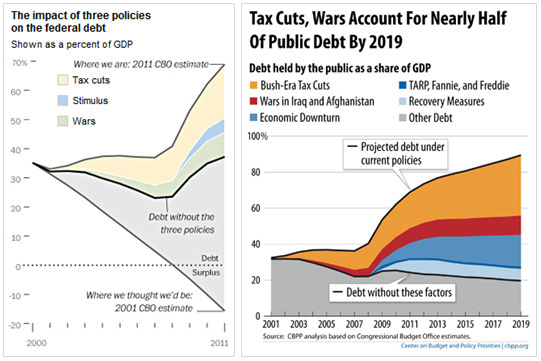The chart provides a quick reminder of how we got here: tax cuts, deregulation leading to the banking meltdown, and war. Of the current 13.6 trillion dollar national debt, 10 trillion dollars were piled up under Republican presidents. The remaining 3.6 trillion could be attributed to Obama in the sense he was sworn in when it accrued, but that does not tell the whole story. The vast majority of “Obama’s debt” came from the Bush tax cuts, the Bush wars, and the Bush recession. A stark contrast with Reagan and Bush II, both of whom inherited a balanced budget. The one thing Obama actually did do, the stimulus, was a tiny, one time addition to the treasure trove lost thanks to conservative policies. And note the one thing you don’t see on that chart: Social Security and Medicare. Keep that in mind as you hear conservatives howl in anger this week demanding we punish future recipients of earned benefits for past Republican cluster fucks.


Yeah, but when you don’t know history, you don’t know that you’re repeating it.
Ah, but you forgot about Goddam-Tax-and-Spend-Marxist-Libruls-Are-Too-Irresponsible-To-Be-Trusted-With-A-Budget-So-Leave-It-To-The-Grownups. Because Shut Up That’s Why!!
And every time history repeats itself, the price goes up.
(From the excellent (but depressing) BBC doc Surviving Progress)
Hmm…I think you’re mixing Santayana with the corollary:
“Those who do not remember the past are condemned to repeat it.”
– George Santayana
“Those who ignore the past are trying to repeat it.”
– Unknown
Gah.
The problem with this whole argument is that it’s founded on a huge pile of false premises. Deficits are not bad. Surpluses are not good. The government budget policies do not directly determine the size of the deficit (that’s mostly done by the private sector). No-one who understood how money worked believed that 2001 CBO projection. Even the idea of adding up the cost of some program (or tax cut) and saying “the deficit would be this much less if we hadn’t done that” is naïve beyond all reckoning. Money simply does not work that way.
Trying to reduce the deficit at this point is the best possible way to break the economy further. The right move is to cut taxes at the low end, spend the money that needs to be spent on things like deferred infrastructure repair, education, etc., and stop obsessing about deficit levels or public “debt”. The only reason to raise taxes on the rich is to address the US’s spiralling levels of income inequality; this will have to happen in the long term, but it has almost nothing to do with the current situation. More important is to prune back the financial sector; it should be no larger than necessary to enable the proper functioning of the real economy.